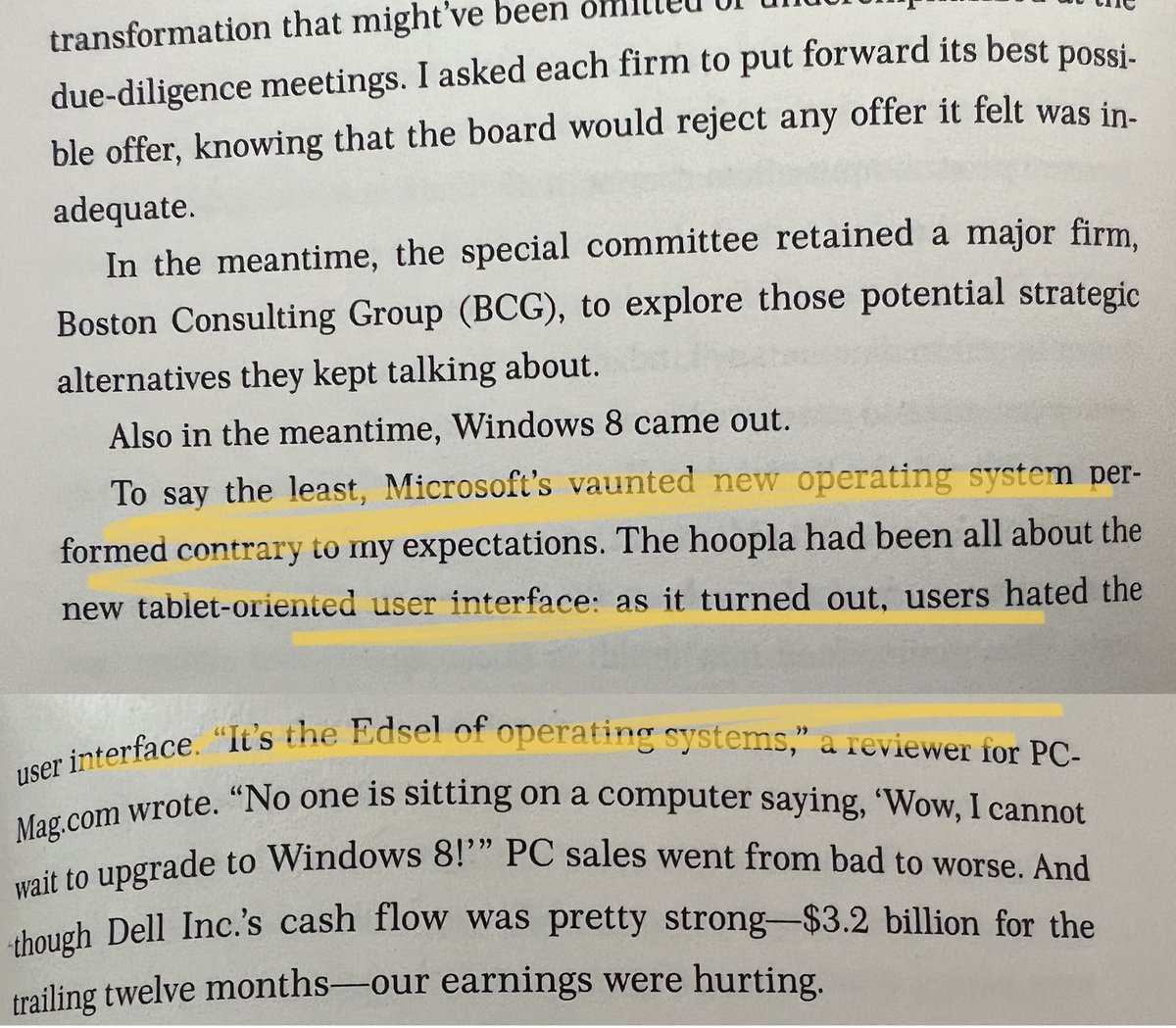
1/ @MichaelDell's new book is out "Play Nice But Win" which is a perfect title for one of the most successful, yet low-key and humble CEOs of any industry who is also the OG PC leader. *Everyone* in tech should read this book. Some of what I felt...smile.amazon.com/Play-Nice-But-… 

2/ Michael's first book (Direct from Dell) is a great story of the nuts and bolts of Dell. Definitely an important book. This book is much more "inside his head" and at times "emotional" about his journey, and reflective. Also Michael is the "last" PC era founder still CEO!
3/ From my perspective it is really several key stories woven together (literally in alternating chapters):
• Founding and Managing of Dell and Michael's upbringing
• Definitive book on the BS of corporate raiding
• Private v. Public company dynamics
• Transforming a tech Co
• Founding and Managing of Dell and Michael's upbringing
• Definitive book on the BS of corporate raiding
• Private v. Public company dynamics
• Transforming a tech Co
4/ Dell's founding story is just incredible. Today people think of PCs as commodities that are outsourced to supply chains and overseas mfg. But in the 1990s, they were products of the US and took a lot of tech. Think "Halt and Catch Fire", but real story (BIOS rev-engineering!)
5/ In fact, most interesting to many will be the "discovery" of the real truth behind the IBM PC, which that it was open which enabled Michael to build even better PCs than IBM was. Even better than Texas-based Compaq with 250x the funding. (PCs/components were a Texas thing!)
6/ The "dorm room" story of Dell is really something. He shares a moment when his parents "find out" he's doing computer stuff when he's supposed to be in college. His Mother almost breaks down. Sharing here because, well, I had this *exact* same experience the same year. 

7/ The book opens in mid-2013 effort to take Dell private. Better than any other book about a corporate raid/LBO (incl Barbarians) this tells the inside story. Michael brings us along on what instigated the move, what prevented the move, how it was received, and more.
8/ We learn the craziness of "greenmail" and also much about the reasons why transforming a public company in the face of short-sighted public markets can be so difficult. Michael artfully tells the whiplash of hearing the public markets value Dell on PC sales...
9/ All while he is optimistic about PC sales for all the right reasons and yet agreeing (and executing) on the need to change the overall strategy and value proposition of Dell. What is wild is how much evidence there already was about Dell's ability to transform.
10/ Those are some of my favorite stories. Few realize that Dell was not given much of a chance to compete in laptops or in servers. Many believed the "Direct from Dell" model could only work with big desktops that could be customized and built to order, certainly not servers.
11/ Michael shares the story of starting very early to include service in Dell's model, long before anyone else (and partnering to deliver that, including the amazing efforts around 9/11). He details early stumbled on laptops, then what it took to win servers (and RAISE prices).
12/ The server story is one that parallels Microsoft's transition to enterprise computing at pretty much the same time. Great pricing discussion. I think about how we used Compaqs, by 2001 or so we were using Dell laptops & servers and dealing with Dell on-site account managers.
13/ The story of going private is really a story about tech transformation. It is going from a hardware provider, to a hardware + service provider, to a hardware + software + services provider of today. To the point where hardware, esp PCs, are loss leaders. Amazing.
14/ There's a great deal of depth to the product, strategy, go to market aspects of the story. That is something I really enjoyed about the book. I admit, I wanted more but the absence means the book can be a perfect book to distribute to a whole team and used as a springboard.
15/ Reading the book one can walk aware realizing something that I am not sure many today quite understand, which is what an incredibly execution machine Dell is while also being a refined product development company in the most elite way.
16/ I will just toss in what Michael says about Windows 8 here, not to defend it (I will write plenty about it) but because Windows 8 came out at the absolute all-time peak of PC sales. Some thought PCs would grow to be 600M units. In 2011 they were 365M. 

17/ Windows 8 came out and while Michael was optimistic (as he is naturally) the truth is what we thought would happen just happened anyway. PC sales dropped to 350M, then 312,…until where we are today with 2020 at a pandemic 275M.
18/ While Michael was optimistic about PC sales they still have not returned (and never will) BUT what the book does not give enough credit to is Dell's execution during this same time--IMO execution is what enabled investment (via cash flow) to transform the company.
19/ In 2011 Dell was struggling with PCs. Before PC sales went down, Dell's market share was going down as Michael tells the story. It wasn't tablets or phones, there was share loss. The shift to laptops didn't do it as much as new "ultrabooks" from Acer, Asus, Lenovo, etc.
20/ Over the next couple of years Dell just absolutely nailed it with the XPS line. To the degree that the XPS 13 is so clearly the "go to" work laptop (IMO, that I recommend to everyone). I knew this at the time. I watched touchpads, for example, go from unusable to the best. 

22/ The transformation to services continued as a private company--told through another incredible first-hand account of a mega-deal. The acquisition of EMC/VMware. Printed book has a photo of the original diagram of the tracking stock done by Harry You and Silverlake's Egon. 

21/ The market results were amazing. Even as US PC sales declined more than 10%, Dell's market share went from ~19% to almost 27% in 2019 (+25% in units). That's not just product excellence, but distribution, account mgmt, and sales excellence.
23/ Michael details his own journey in bringing on the team and integrating with a massive and successful company. Earlier in the book we learn about Michael's commitment to building an exec team early on and he even mentions this super interesting story that ran in 1995. 

24/ So anyway that's enough sharing details. There's a great deal for any team to talk about from this book. It is a perfect book for a whole exec or product team to read and there are clearly ways to discuss the details. There's an appendix "Things I believe" that is great.
25/ Audio version is a treat with Michael narrating the whole book. It makes the biography portions especially touching as we learn about Michael's commitment to family, philanthropy, and people. // END smile.amazon.com/Play-Nice-But-…
PS/ Here's an @a16z podcast where Michael joins @martin_casado @pmarca and @smc90 that is worth a listen future.a16z.com/podcasts/cloud…
• • •
Missing some Tweet in this thread? You can try to
force a refresh











